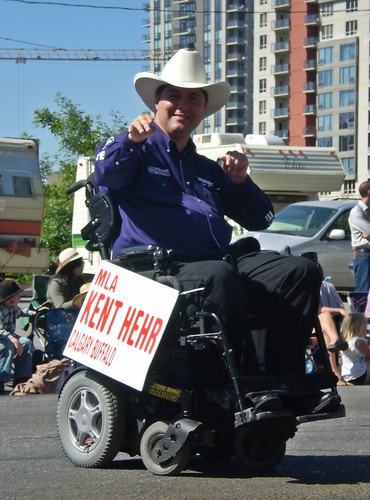The introduction of Bill 13, the Alberta Senate Election Act, this week inspired me to pull out an old copy of the Special Select Committee on Senate Reform report, Strengthening Canada, from March 1985. The committee, chaired by Calgary-Currie MLA Dennis Anderson, published a report that led to the creation of the original Senatorial Selection Act in 1989 and subsequent Senate nominee elections in 1989, 1998, 2004 and 2012.

The 1980s were heady times for constitutional debaters and Senate reform advocates in Canada. Dozens of reports from various governments, organizations, and think-tanks studied the idea of reforming Canada’s appointed Upper Chamber.
Unlike today, when the majority of Senators sit as Independents, decades of federal Liberal Party governments had led to the 1980s Senate being overflowing with Liberal partisan appointees.
A motion from Minister of Federal and Intergovernmental Affairs Jim Horsman on November 23, 1983 led to the creation of the committee, which included 7 MLAs from the Progressive Conservative caucus, including Anderson, Calgary-North West MLA Sheila Embury, Highwood MLA Harry Alger, Calgary-Egmont MLA David Carter, Lacombe MLA Ron Moore, Edmonton-Kingsway MLA Carl Paproski, and Innisfail MLA Nigel Pengelly, and Independent former Social Credit MLA Raymond Speaker. The group spent more than a year consulting and studying the issue in Alberta, Canada and abroad.
The motion to create the committee and the 1985 and 1987 motions to hold Senate elections had cross-partisan support – including from the PC, New Democratic Party and Liberals. This is a marked difference from today, where the NDP are advocates of Senate abolition, the Liberals have their banished Senators from their federal caucus, and Conservatives (at least when they are in government) have largely fallen back into supporting the current appointed Senate model.

The committee report tabled in the Legislative Assembly in 1985 included a number of recommendations for reforming the Senate that are much more ambitious than anything being presented by Senate election advocates today.
Unlike the unimaginative Senate Election Act, which is a largely farcical exercise, the Special Select Committee on Senate Reform called for wide-ranging constitutional reforms that would reorganize and increase the democratic accountability of the Upper Chamber.
The 1985 report recommended Senators should be elected using a first-past-the-post system and that they should represent constituencies identical to provincial boundaries. Senators would be elected for the life of two provincial legislatures with staggered elections allowing for three to be elected during each provincial election, with each voter being able to vote for three candidates.
The number of Senators would have been dropped to 64 had the committee had its way, with six representing each province and two representing each territory. This would presumably fulfill the “equal” part of the call for a Triple-E Senate (the other Es being effective and elected).
The report also recommended that “the Senate should be organized on a different basis than any other Upper House in the Commonwealth,” including being organized without the recognition of political parties.
The report argued that “if the role of the Senate is to represent the regions (provinces) of the country, it must be structured to represent those regions’ interests rather than the interest of national political parties.” This is somewhat reflective of the current Senate, where the majority of members sit as Independents rather than members of political parties.
The report recommended that traditional opposition and government roles in the Senate be abolished, including the positions of Government Leader and Opposition Leader, and that Senators should physically be seated in provincial delegations regardless of any party allegiances. Each provincial delegation would select a chairman who would should sit at the pleasure of the provincial delegation and participate in a Senate Executive Council, which would, along with the Speaker, determine the order of business of the Senate.
The report also called for the qualifications for candidates to the Senate to be made the same as those for Members of Parliament, removing minimum 30 years old age requirement of and $4,000 property ownership requirement.
It also noted that “the Senate should not be a forum for inter-governmental negotiations.”
Now a quick look at Bill 13, the Senate Election Act

The Senate Election Act introduced by Justice Minister Doug Schweitzer this week would allow the Senate nominee candidates to be chosen through an election but then, if the Prime Minister decides to appoint the winners, which he is not bound to do, they will be able to serve their time in the Senate until the age of 75 without ever having to face re-election.
The biggest flaw with this bill and Alberta’s previous Senate election laws is that there is no real accountability if these elected Senators never have to face re-election.
Bill 13 is being introduced to replace the Senatorial Selection Act, which expired on December 31, 2016. But the bill is largely an extension of United Conservative Party Premier Jason Kenney‘s campaign against Liberal Party Prime Minister Justin Trudeau ahead of the October 2019 federal election.
The Act introduced this week would have Senate candidates nominated by provincial political parties or as Independent candidate, but list their federal political party affiliation next to their name on the ballot. This is a significant change from the previous Senate nominee elections when candidates were listed under provincial party banners. It is unclear whether the federal political parties will have any say about the candidates who align with them in a provincially-administered Senate election.
Kenney and Schweitzer announced that the next Senate election will take place during the October 17, 2021 municipal elections, which will also be the date of the promised “equalization referendum.” It has been speculated that these events are scheduled on this date in order to boost conservative voter turnout in the municipal elections and fulfill the Conservative Party’s long-time dream of defeating Naheed Nenshi and electing a capital-C conservative into the mayor’s office in Calgary.





